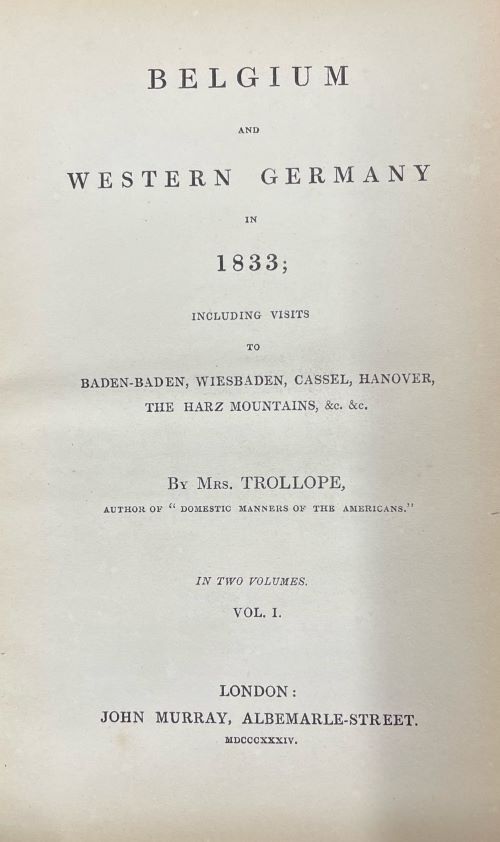What better author from the Liberty Fund archives could there be to mark Women's History Month than Frances "Fanny" Trollope? The mother of the prolific and respected novelist Anthony Trollope, Frances Trollope is widely considered to be one of the first women who supported herself and her family through the proceeds of her writing.
The Reading Room
Trollope’s Belgium and West Germany: From the Liberty Fund Rare Book Room
She began to write in her early 50s, when her husband's business failures left her family impoverished and in debt. Her acerbic portrait of Americans in her first work, Domestic Manners of the Americans made her wildly popular in England, though less so in the US. This distinction is understandable, given observations such as:
“A single word indicative of doubt, that any thing, or every thing, in that country is not the very best in the world, produces an effect which must be seen and felt to be understood. If the citizens of the United States were indeed the devoted patriots they call themselves, they would surely not thus encrust themselves in the hard, dry, stubborn persuasion, that they are the first and best of the human race, that nothing is to be learnt, but what they are able to teach, and that nothing is worth having, which they do not possess.
But despite the resentment of Americans book sold very well, and it and further travelogues, novels (including The Adventures of Jonathan Jefferson Whitlaw, the first anti-slavery novel), and endless poems and articles soon moved her family out of debt, and (I suspect) inspired her son's equally impressive productivity and literary entrepreneurship.
Our library's copy, from the Hamburger collection makes a point of emphasizing Trollope's earlier work--suggesting that its popularity and Trollope's reputation were enough to sell future books. Also, note that she is modestly referred to as "Mrs. Trollope," a reminder of how daring it was for a women to publish under her own name at the time.

Our library's copy, from the Hamburger collection makes a point of emphasizing Trollope's earlier work--suggesting that its popularity and Trollope's reputation were enough to sell future books. Also, note that she is modestly referred to as "Mrs. Trollope," a reminder of how daring it was for a women to publish under her own name at the time.
